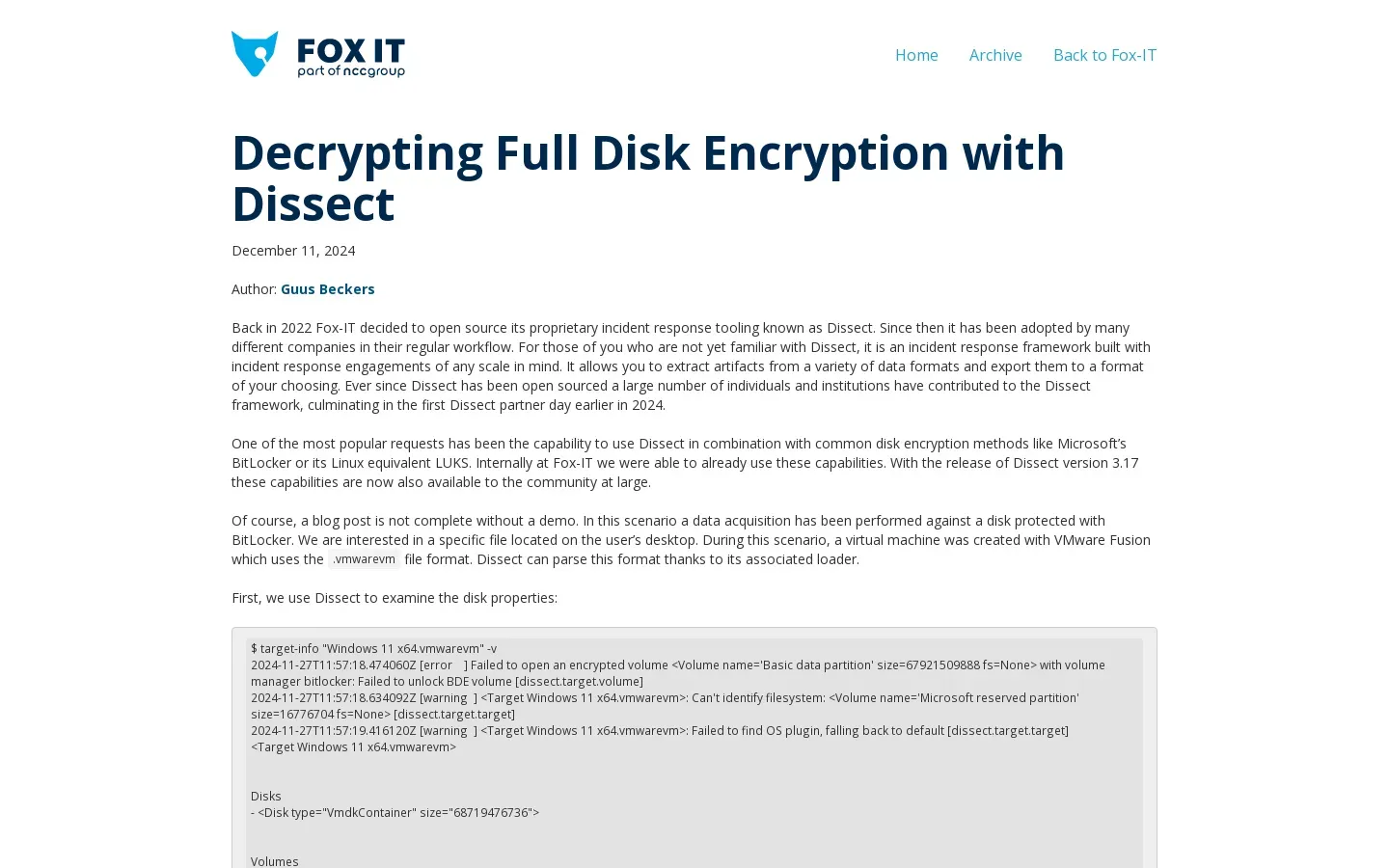
Fox-IT Releases Open-Source Dissect Framework for Incident Response
/ 3 min read
Quick take - Fox-IT has transitioned its incident response tool, Dissect, to an open-source model, enhancing its capabilities with new features for decrypting encrypted disks and fostering community contributions since its 2022 release.
Fast Facts
- Fox-IT has transitioned its proprietary incident response tool, Dissect, to an open-source model, enhancing its adoption since 2022.
- The latest update, Dissect version 3.17, introduces decryption capabilities for BitLocker and LUKS, improving flexibility across Windows and Linux systems.
- Active community contributions have led to the inaugural Dissect partner day scheduled for 2024, highlighting the tool’s growing relevance.
- Users are encouraged to familiarize themselves with the new features and prepare a keychain CSV file for efficient decryption processes.
- Comprehensive documentation and practical demonstrations are available to assist users in navigating the updated framework and avoiding common pitfalls.
Fox-IT’s Dissect Framework: A New Era in Open-Source Incident Response
In a notable advancement for the cybersecurity landscape, Fox-IT has transitioned its proprietary incident response tool, Dissect, to an open-source model. This strategic move, initiated in 2022, has significantly broadened the tool’s adoption across various organizations. Designed as a versatile framework, Dissect empowers analysts to efficiently extract artifacts from diverse data formats, making it suitable for engagements of any scale.
Community Contributions and Enhancements
Since becoming open-source, Dissect has benefited from active community contributions. This collaborative effort is highlighted by the upcoming inaugural Dissect partner day in 2024. The event underscores the tool’s growing importance in incident response, driven by user feedback and requests for enhancements. A key area of focus has been the integration of common disk encryption methods such as BitLocker and LUKS.
The latest update, Dissect version 3.17, introduces critical capabilities for handling encrypted disks. Users can now decrypt these disks using various methods, including a passphrase, recovery key, or BitLocker file. This enhancement not only increases the tool’s flexibility but also extends its applicability across different operating systems, with confirmed compatibility for both Windows and Linux environments.
Utilizing New Features
To maximize the benefits of these new features, users should ensure they are operating on the latest version of Dissect (3.17). Familiarity with the framework is crucial to accessing the enhanced decryption capabilities. Analysts are advised to prepare a keychain CSV file containing necessary decryption information to streamline the process. Additionally, using commands like target-info can help verify the functionality of their keychain.
Practical Demonstrations and Documentation
Fox-IT has prioritized user-friendliness by offering practical demonstrations that guide users through decrypting a BitLocker-protected disk and extracting specific files. These demonstrations serve as valuable learning resources for those new to the framework and highlight its robust capabilities.
Complementing these developments is comprehensive documentation available on the Dissect Docs page. This resource assists users in navigating the new decryption features and commands effectively. By providing clear and accessible guidance, Fox-IT promotes a deeper understanding and application of the Dissect framework in real-world incident response scenarios.
Implications and Best Practices
As more organizations adopt the Dissect framework, it is crucial for users to avoid common pitfalls. One significant error is assuming that all external tools will work seamlessly with decrypted disks without prior testing; this can lead to compatibility issues that impede response efforts. Understanding the various decryption methods available is essential to fully leverage Dissect’s potential.
The evolution of the Dissect framework represents a pivotal moment in incident response, equipping analysts with powerful tools to address modern cybersecurity challenges effectively. With continued community support and enhancements, Dissect is poised to solidify its position as a leader in open-source incident response solutions.



